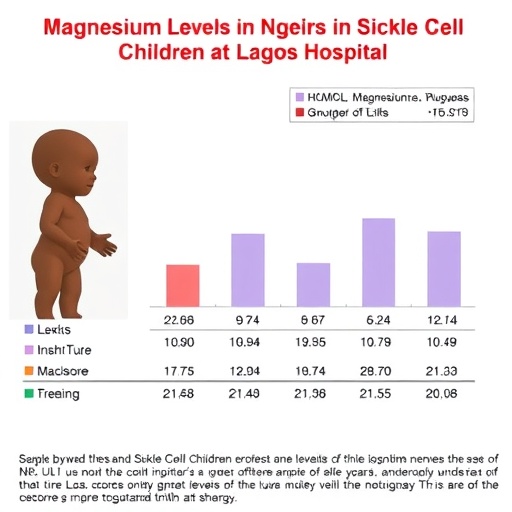Recent research conducted at the Lagos University Teaching Hospital has shed light on an often-overlooked aspect of pediatric healthcare: serum magnesium levels in children diagnosed with sickle cell anemia. This comparative cross-sectional study, led by Akowundu and colleagues, aims to unearth the nuanced interplay between magnesium deficiency and the myriad complications associated with sickle cell anemia. Recognizing the importance of trace minerals in childhood development and overall health, this investigation comes at a critical juncture, given the rising prevalence of sickle cell diseases in various regions of the world.
Sickle cell anemia, a genetic disorder that alters the hemoglobin within red blood cells, significantly affects individuals’ health from childhood through adulthood. The disease leads to chronic pain, frequent infections, and serious complications such as stroke and acute chest syndrome. Among these issues, clinicians have begun to explore how mineral deficiencies, particularly in magnesium, could exacerbate health challenges faced by these children. Magnesium is a vital mineral involved in numerous biochemical reactions in the body, including those associated with muscle function, energy production, and nerve transmission.
The study embarked on a mission to quantify serum magnesium levels among children with sickle cell anemia, contrasting these findings with those from a control group of healthy children. The reasoning behind this methodology stems from a growing body of evidence suggesting that children with chronic illnesses may face a higher risk of nutritional deficiencies, which could further compromise their health status. Understanding these deficiencies is essential for developing targeted interventions that could improve the quality of life and health outcomes for these vulnerable patients.
Upon gathering data from a significant cohort of participants, the researchers conducted a thorough analysis of serum magnesium levels, employing standardized methods to ensure accuracy and reliability. The results revealed concerning trends, as the children with sickle cell anemia frequently exhibited lower levels of serum magnesium when compared to their healthy counterparts. This finding aligns with previous studies that have indicated a potential link between magnesium deficiency and increased morbidity in various chronic conditions, including hematological disorders.
Furthermore, the researchers delved into the potential implications of low magnesium levels, noting how these deficiencies could contribute to a wide array of health complications, particularly those impacting muscle and nerve function. In the case of sickle cell anemia, where tension and acute episodes of pain can severely affect the patient’s quality of life, recognizing the role of magnesium becomes paramount. Could addressing this deficiency lead to measurable improvements in health outcomes?
Beyond the immediate health implications, this research raises important questions regarding the broader nutritional status of children suffering from sickle cell anemia. The findings compel medical professionals to reconsider existing healthcare frameworks and develop comprehensive strategies that encompass dietary assessments and mineral supplementation where necessary. Integrating nutritional education and support into the management plans for these children could potentially uplift their overall well-being while addressing the unique challenges they face.
In light of the findings, it is essential to explore potential pathways for further research that could unravel the multifaceted nature of magnesium’s role in the health of those with sickle cell anemia. Future studies could focus on interventional approaches aimed at correcting magnesium deficiency and assessing the clinical outcomes associated with such improvements. Would patients experience fewer pain crises? Would their overall health markers reflect the positive impacts of adequate magnesium levels?
The dialogue surrounding nutritional deficiencies in chronic pediatric illnesses calls for urgency, especially when considering the implications for healthcare policies and support systems. Health practitioners, researchers, and policymakers must unite to prioritize the nutritional health of children, particularly those battling chronic conditions like sickle cell anemia. As the global health community works towards bettering the lives of patients with such disorders, understanding and acting upon the importance of nutrient management is essential.
In conclusion, the study conducted at the Lagos University Teaching Hospital unveils critical insights into the biochemical landscape of children living with sickle cell anemia. By highlighting the significance of serum magnesium levels, it encourages a shift in focus towards nutritional care in chronic illness management. Such research is pivotal and should ignite passions within the healthcare community to advocate for better health outcomes through the lens of nutrition. Ultimately, as this challenge continues to unfold, the possibilities of improving health through science and nutrition remain vast and full of hope.
Subject of Research: Serum magnesium levels in children with sickle cell anemia
Article Title: Serum magnesium levels of children living with sickle cell anaemia at the Lagos University Teaching Hospital: a comparative cross-sectional study.
Article References: Akowundu, P.K., Salako, A.O., Akinsete, A.M. et al. Serum magnesium levels of children living with sickle cell anaemia at the Lagos University Teaching Hospital: a comparative cross-sectional study. BMC Pediatr 25, 856 (2025). https://doi.org/10.1186/s12887-025-06079-5
Image Credits: AI Generated
DOI:
Keywords: Sickle cell anemia, magnesium deficiency, pediatric healthcare, chronic illness, nutritional status.
Tags: acute chest syndrome and magnesiumbiochemical role of magnesium in the bodychronic pain in sickle cell patientscomplications of sickle cell diseasegenetic disorders and mineral deficienciesimportance of magnesium in pediatric healthLagos University Teaching Hospital researchmagnesium deficiency in sickle cell anemiapediatric healthcare in Lagosserum magnesium levels in childrensickle cell anemia prevalencetrace minerals and childhood health





